Exploring the Luxury Real Estate Market in Dubai
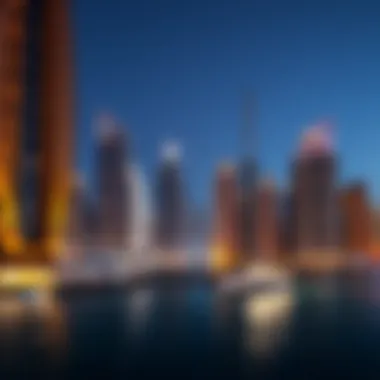
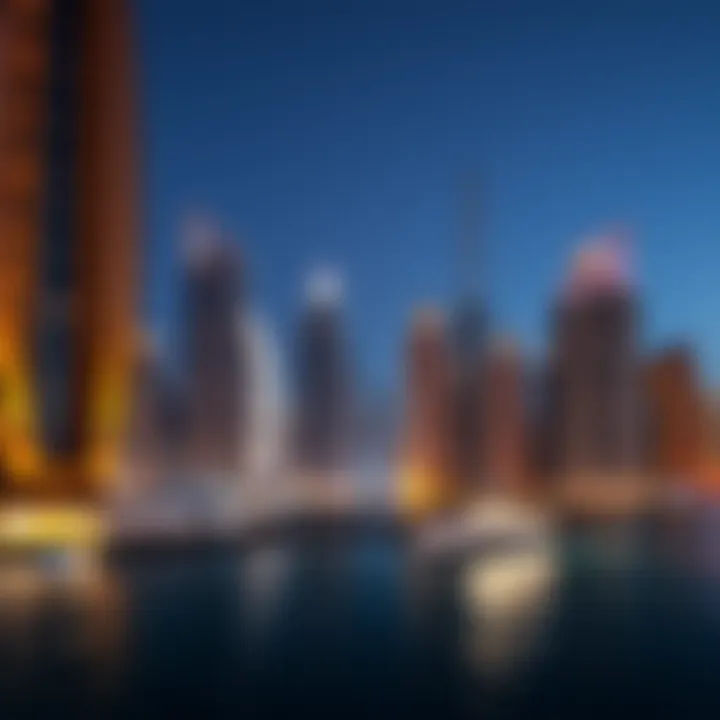
Intro
The glitzy skyline of Dubai captivates many, mesmerizing onlookers with its futuristic architecture and vibrancy. But beyond the shimmering towers and designer boutiques lies a profound ecomony—one driven by luxury properties that redefine the concept of upscale living. Investors and home buyers alike find themselves drawn to this unique market, with its captivating blend of cultural richness and modernity. This journey through Dubai's luxury real estate scene is not just a guide; it's a compass for those seeking to navigate its complexities.
Engagement in this market can feel like stepping into a different world, where every street tells a story of wealth and exclusivity. So, what makes Dubai's luxury properties stand out? How can potential buyers and investors make sense of the trends and opportunities available? In this article, we will unpack these questions and dig deep into the elements that shape the luxury property landscape of one of the globe's most glamorous cities.
From current market trends and future projections to insightful neighborhood comparisons, we’ll cover every angle to give you a complete picture. With the legal dynamics in play and investment strategies to consider, we aim to provide an extensive resource for those looking to stake their claim in this thriving market. By the end, readers will have a clearer understanding of what it truly means to invest in Dubai’s luxury real estate sector.
Foreword to Dubai Luxury Properties
Dubai, a city known for its dazzling skyline and opulent lifestyle, has firmly established itself as a key player in the global luxury property market. The vast offerings in luxury residences attract diverse buyers, from affluent expatriates to international investors, making it a focal point for high-end real estate. This segment of the property market is not merely about grand estates; it encompasses a lifestyle choice, an investment strategy, and a cultural experience all rolled into one.
The importance of delving into the realm of Dubai luxury properties lies in understanding its profound impact on both local and international markets. When discussing luxury living in Dubai, it is crucial to acknowledge how the city’s development trajectory influences property values, buyer preferences, and overall market dynamics.
For potential investors and homebuyers, grasping the appeal of these properties goes beyond aesthetic appeal. Whether you’re a seasoned investor or a first-time homebuyer, recognizing specific elements—such as market demands, the uniqueness of neighborhoods, and lifestyle amenities—paves the way for informed decisions. Each luxury property in Dubai often tells a story, whether it’s through its architecture, location, or the community it fosters.
Consider the unique advantages that accompany luxury living in this dynamic city:
- Investment Potential: Properties in prime locations witness significant appreciation, rich rental yields, and often enjoy tax benefits.
- Lifestyle Choices: The offerings extend from smart home technologies to lavish amenities, catering to high-end lifestyle preferences.
- Cultural Enrichment: Buyers can immerse themselves in a melting pot of cultures, with diverse influences evident in the architecture and community life.
For investors, the allure of luxury properties in Dubai is multifaceted. It's not only about acquiring a piece of real estate but also about tapping into a lucrative market that is continuously evolving. The landscape of Dubai luxury properties serves as a mirror reflecting the ambitions and aspirations of a city that dreams big. Understanding this market helps individuals and investors devise strategies aligned with their financial goals.
As we journey through this exploration of Dubai's luxury properties, we'll examine the historical context, notable neighborhoods, architectural styles, and the vital considerations needed for successful investment. Each facet painted in this article paints a vivid picture of what luxury living in Dubai entails and the profound opportunities it presents.
Historical Context of Dubai's Real Estate Development
Understanding the historical context of Dubai's real estate development is crucial for anyone looking to grasp the intricacies of the luxury property market in this vibrant city. The evolution of Dubai from a modest fishing village to a global hub of luxury living and real estate is a fascinating journey that underscores various economic, cultural, and political influences that have shaped its landscape.
Historically, Dubai operated as a trading port and was primarily dependent on pearl diving and fishing. The discovery of oil in the 20th century transformed its economy dramatically. With newfound wealth, the emirate invested heavily in infrastructure, resulting in rapid urbanization. Consequently, this wealth attracted international attention, leading to a sharp increase in foreign investment and expatriate communities.
Over the decades, Dubai's skyline has evolved drastically. From the early days of simple structures, the area now boasts architectural marvels like the Burj Khalifa and the Palm Jumeirah. This continuous transformation not only appeals to luxury buyers but also represents a mix of cultural identities, styles, and architectural feats that define the emirate. The city has become synonymous with opulence and excess, often setting benchmarks for luxury developments worldwide.
As the wheels of development turned, it became pivotal for potential investors, homebuyers, and other stakeholders to understand the historical context of this transformation. Knowledge of how Dubai's real estate sector evolved can provide insights into current trends and predict future movements in the market. As such, the next sections will delve deeper into specific developments since that initial oil boom—this is where we discover the earnest shift from desert to sprawling metropolis.
The Transformation from Desert to Metropolis
The transformation of Dubai from barren desert to a bustling metropolis is nothing short of extraordinary. In the mid-20th century, Dubai's vast, arid land was primarily used for basic agriculture and limited settlement. The vision of Dubai's leaders laid the groundwork to turn the challenging environment into a thriving city.
Investments in infrastructure—roads, bridges, and eventually airports—laid the foundation. The development of the Jebel Ali Port in the 1970s marked a watershed moment, positioning Dubai as a crucial trade hub. This not only facilitated increased commercial activities but also ushered in a wave of migration, creating a melting pot of cultures that now characterizes the city.
The real estate development that followed was a direct result of strategic planning. In the late 1990s, significant projects aimed at creating luxurious residential and commercial spaces began to emerge. Towering skyscrapers started to puncture the skyline. Enclaves like Dubai Marina not only showcased residential luxury but also catered to the changing lifestyles of its international residents, mirroring global architectural trends while maintaining unique local aesthetics.
Notably, the UAE's vision to diversify its economy away from oil dependence required a strong focus on the tourism and real estate sectors. As a result, luxury living became not just a lifestyle choice but a strategic investment avenue for global investors, investors—fueling a housing boom that continues to captivate buyers from across the globe.
Key Milestones in Real Estate Evolution
Throughout the years, several key milestones have outlined Dubai's real estate evolution, allowing the sector to flourish and draw substantial investment.
- Oil Discovery (1966): Marked the beginning of rapid development, opening opportunities for growth and modernization.
- Development of Dubai Free Zones (1980s): Created attractive conditions for international businesses, paving the way for expatriate residents.
- Launch of Emaar Properties (1997): Emaar became synonymous with landmark developments such as the Burj Khalifa and Dubai Mall, shaping the luxury market.
- Introduction of Freehold Property Laws (2002): Allowed foreign investors to purchase property within designated areas, vastly increasing participation in the real estate market.
- Dubai's Hosting of World Expo (2020): Although postponed, the expo aimed to significantly boost tourism and real estate investment, showcasing the city on a global platform.
These milestones are not just historical facts; they provide insights into the trends and patterns that continue to influence current and future developments in Dubai's luxury properties.
This rich context sets the stage for understanding Dubai's myriad luxury accommodations, further discussed in the upcoming sections.
The Appeal of Luxury Living in Dubai
Luxury living in Dubai unfolds like a rich tapestry, woven from threads of comfort, sophistication, and exclusivity. It draws individuals from all corners of the globe, lured not only by opulent properties but also by the underlying lifestyle that these dwellings offer. The charm of residing in a luxury property in Dubai transcends bricks and mortar; it embodies the promise of an enviable lifestyle intertwined with modern innovation and cultural heritage.
Lifestyle and Amenities in Luxury Properties
When one thinks of luxury living in Dubai, the amenities often stand out. These homes aren’t just residences; they are gateways to an elevated existence. Many properties come equipped with state-of-the-art fitness centers, sprawling infinity pools, and private cinemas.
- Spa and Wellness Centers: Residents can indulge in spa treatments, personal trainers, and wellness coaches all under one roof, championing a holistic lifestyle.
- Smart Home Features: Advanced technology ensures that homes operate at peak comfort and convenience, with integrated systems controlling everything from lighting to climate at a mere touch.
- Exclusive Social Spaces: Communal areas such as rooftop terraces and lounges offer residents the chance to socialize and network, making it an ideal setting for professionals and families alike.
In addition, proximity to high-end shopping centers like The Dubai Mall or Mall of the Emirates ensures that everything is within reach. Living in a luxury property often means having unparalleled access to gourmet dining options, entertainment venues, and cultural landmarks.
This lifestyle is not devoid of consideration; it attracts a diverse demographic, including expatriates and affluent locals, all of whom are seeking more than just a home but a community vibrantly alive with cultural richness and modernity.
Cultural Influences on Luxury Real Estate
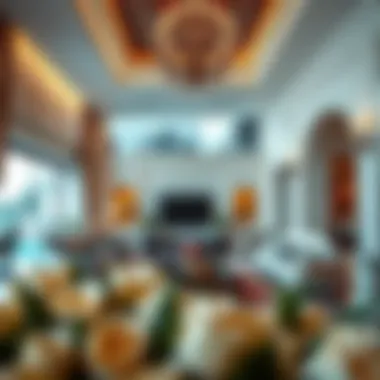
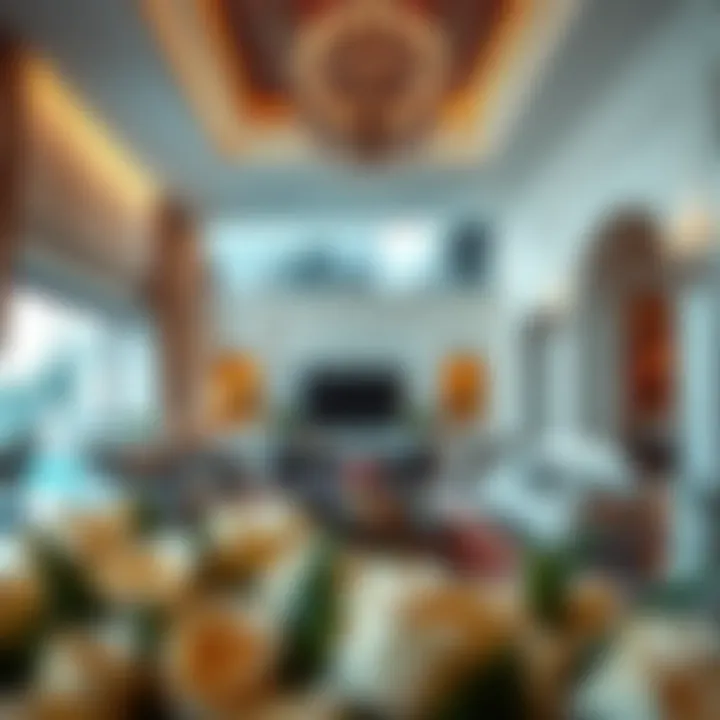
The essence of Dubai's luxury real estate scene is heavily influenced by the region's cultural backdrop. Blending tradition with contemporary tastes is what sets Dubai apart from other global cities.
The architectural designs often reflect Islamic artistry intertwined with modern aesthetics, from intricate tile work to sweeping arches. Many luxury homes incorporate cultural elements, ensuring that they resonate with a deeper sense of place and heritage.
- Inspirations from Arab Culture: The layout of these properties typically accommodates family values, showcasing communal areas that are perfect for gatherings – a nod to the cultural emphasis on family.
- Diverse Design Influences: Many properties also adopt international design styles, fusing features from Mediterranean, contemporary, and even Asian architecture, thus attracting a global clientele.
Moreover, Dubai serves as a melting pot of cultures, contributing to an ever-evolving luxury market. The blend of Western influences and traditional Middle Eastern values results in a unique real estate landscape that captivates both lifestyle aspirations and investment interests.
"In Dubai, luxury is not just a privilege; it's an experience shaped by culture, community, and cutting-edge innovation."
Ultimately, the appeal of luxury living in this vibrant city lies not just in what you own, but in how those possessions enhance your way of life amidst a rich cultural milieu.
Housing trends reflect these values, making luxury properties a desirable investment for buyers looking to integrate into a lifestyle that echoes Dubai's spirit.
By understanding these specific elements and benefits, potential investors and homebuyers can make informed decisions that enrich their experience in one of the most dynamic real estate markets in the world.
Key Neighborhoods for Luxury Properties
In the ever-evolving landscape of Dubai's luxury real estate, the neighborhoods play a pivotal role. Each area is distinct, offering a unique blend of lifestyle, amenities, and investment potential. For prospective buyers and investors, understanding these neighborhoods is fundamental. A property's location often dictates not just its market value but also the lifestyle it provides. This section delves into four key neighborhoods that represent the epitome of luxury living in Dubai.
Palm Jumeirah: A Symbol of Luxury
Palm Jumeirah stands as an iconic testament to Dubai's ambition and prosperity. This man-made archipelago is often associated with opulence, featuring lavish villas, upscale apartments, and exclusive hotels. Living here means being surrounded by stunning views of the Arabian Gulf, access to private beaches, and a variety of gourmet restaurants. Residents often enjoy amenities like private pools, spas, and even private yacht docks.
Palm Jumeirah's appeal lies in its unique structure resembling a palm tree, resulting in waterfront properties that provide unparalleled access to sea activities. Moreover, the area boasts a vibrant nightlife and high-end shopping at places like The Pointe and Atlantis, attracting a mix of international buyers and local elites. But one must consider the premium prices associated with this luxurious locale.
Dubai Marina: Urban Sophistication
Dubai Marina exemplifies contemporary living with an urban twist. This bustling waterfront locality is known for its skyscrapers that line the marina, each telling a tale of architectural innovation. The vibrant promenade is perfect for an evening stroll, showcasing a blend of luxury yachts and dining options that can satisfy any palate.
Living in Dubai Marina means enjoying a lifestyle filled with events and activities. The area is renowned for its social scene, making it a preferred choice for young professionals and expats. Investors often find high rental yields here due to the high demand from both residents and tourists. Yet, while the area is bustling, it’s crucial to weigh the benefits of vibrant city life against the noise and hustle that can sometimes overwhelm.
Downtown Dubai: Iconic Landmarks
When speaking of luxury in Dubai, one cannot overlook Downtown Dubai, home to the Burj Khalifa and Dubai Mall. This neighborhood reflects the heart of the city and is a hub for both commercial and residential properties. High-end apartments offer breathtaking views of iconic landmarks and are surrounded by lavish dining and retail options.
The allure of Downtown goes beyond its visuals; it embodies the spirit of Dubai's success. Major events frequently occur here, drawing crowds for celebrations and festivals. For investors, properties in this area often fetch a premium due to their proximity to significant attractions and business centers. However, potential buyers should be mindful of the premium pricing that comes with such prestigious addresses.
Emirates Hills: A Gated Community Experience
Emirates Hills offers a serene, secure environment that many high-net-worth individuals seek. This gated community is often compared to Beverly Hills, featuring luxurious villas designed with sophisticated aesthetics. The community is set around an exclusive golf course, allowing residents to indulge in leisure activities right at their doorstep.
Living in Emirates Hills means embracing a slower-paced, more tranquil lifestyle. Its greenery and sweeping views create an atmosphere that feels removed from the city's hustle. However, while the lifestyle is enticing, prospective buyers should be prepared for the high entry costs and understand the exclusivity of the community.
"Location is more than just a point on a map; it's the very essence that can elevate or undermine one's investment potential."
In summary, each neighborhood offers a unique blend of luxury, lifestyle, and investment opportunities. Understanding these aspects can significantly aid buyers and investors in making informed decisions regarding Dubai's luxury property market.
Architectural Styles of Luxury Homes
When one thinks of luxury living in Dubai, the architectural styles of the homes immediately come to mind. This aspect is significantly important, as the designs not only reflect opulence but also embody the cultural and social aspirations of the city's residents. The architectural landscape serves as a clear indicator of the market's evolution and gives potential buyers insight into their investment choices. It often dictates property value, desirability, and even the lifestyle that comes with living in such luxurious dwellings.
In this section, we'll peel back the layers of architectural styles that dominate the Dubai luxury property market, discussing contemporary designs and innovations, alongside traditional Arabic influences. Each style has a unique story and value proposition, making it essential for potential buyers and investors to appreciate the nuances.
Contemporary Designs and Innovations
Dubai’s skyline is a testament to modernity. Contemporary designs dominate the luxury real estate scene with sleek lines and avant-garde structures capturing the attention of the world. These homes often use cutting-edge technology and sustainable systems, integrating features like smart home capabilities and energy-efficient designs. Architecturally, they tend to favor open floor plans that enhance natural light, often using glass facades that blur the line between indoor and outdoor living.
- Sleek Designs – The aesthetic appeal of contemporary homes lies in their minimalist approach. Clean lines, bold volumes, and striking materials like steel, concrete, and glass define their look. Properties such as the Burj Khalifa Residences offer a glimpse into this world of luxurious simplicity.
- Innovative Use of Space – A characteristic feature of contemporary designs is the clever use of space. Homes are designed not just for luxurious living, but for functionality as well. For instance, multi-purpose rooms that dynamically change usage based on the homeowner’s needs are increasingly popular.
- Sustainability – The shift towards eco-friendly features also cannot be overlooked. Many luxury developers are now adopting green building practices. Solar panels, rainwater harvesting systems, and energy-efficient fixtures are incorporated to create homes that are not only luxurious but also responsible.
Architectural innovations in Dubai are pushing boundaries. The marriage of aesthetics and sustainability shows a trend that not only values luxury but also respects the environment.
Traditional Arabic Influences
While modernity is a hallmark of Dubai's luxury landscape, the rich heritage of traditional Arabic influence is an integral part that must not be overlooked. This style brings a sense of identity and cultural depth to luxury properties, making them stand out in this fast-paced global market. Traditional Arabic architecture often features intricate designs, ornate details, and a connection to the cultural history of the region.
- Mashrabiya Elements – A signature aspect of traditional architecture is the use of mashrabiya, which are wooden latticed screens that provide privacy while allowing airflow and natural light. These stunning designs bring elegance to luxury villas and reflect the artistry of Arabic craftsmanship.
- Courtyards and Gardens – Many luxury properties incorporate spacious courtyards that serve as private retreats and communal areas. These gardens often include water features—an ode to the region’s reliance on water, symbolizing life and prosperity.
- Traditional Materials – Often, natural materials like limestone and marble are employed, echoing the Earth’s hues. These materials not only reflect the region’s natural beauty but also provide a sense of warmth and permanence that many luxury buyers seek.
In summary, understanding the architectural styles of luxury homes in Dubai equips prospective buyers and investors with the necessary insights to make informed decisions. From cutting-edge contemporary designs that embrace modern living, to homes steeped in traditional Arabic influences that tell a story, each property is a unique investment in a vibrant market.
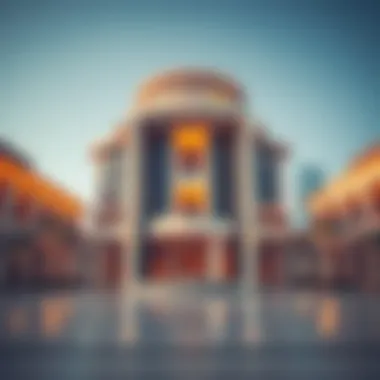
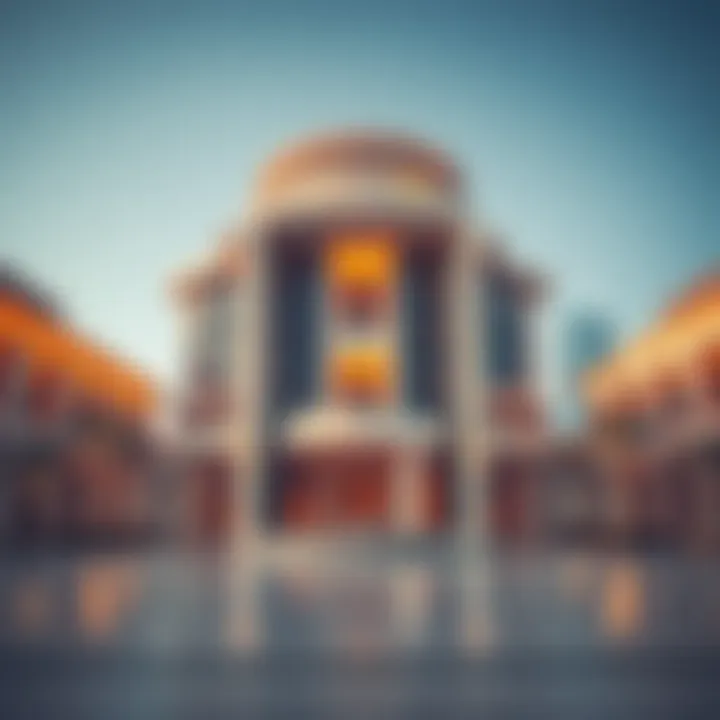
Investment Opportunities in Dubai Luxury Properties
Investing in luxurious properties in Dubai goes beyond mere real estate acquisition. It involves understanding a dynamic market that offers unique potential for both returns and lifestyle. The appeal of Dubai as a cosmopolitan city with a strategic geographic location makes it a focal point for high-net-worth individuals looking to diversify their investment portfolios. In this section, we will delve into the critical facets of investment opportunities within Dubai's high-end property market, considering factors such as demand, market dynamics, and economic stability.
Understanding the Market Dynamics
Dubai’s luxury property market is influenced by several factors that contribute to its unique investment landscape. After the global financial crisis of 2008, the market witnessed a rapid recovery fueled by a resurgence in foreign investment, infrastructural advancements, and a government focus on long-term economic stability.
- Demographic Shifts: The city has seen an influx of expatriates, driving demand for upscale living spaces. More than 80% of Dubai's population consists of foreigners, creating a robust rental market.
- Strategic Initiatives: The Vision 2021 initiative and Expo 2020 have positioned Dubai as a hub for global business and tourism, fostering investment confidence. Government efforts to streamline business regulations further attract international investors.
- Market Segmentation: The luxury segment enjoys its own set of dynamics. Properties in upscale neighborhoods often see higher demand and thus command premium pricing.
Investors must stay aware of ongoing trends, paying attention to economic indicators, interest rates, and migration patterns that shape demand across various property types. For instance, the introduction of long-term visas for expatriates may influence purchasing behavior, effectively making Dubai a more attractive proposition for those looking to invest.
Rental Yields and Returns on Investment
Investors eyeing Dubai's luxury properties are often keen on the potentials of rental incomes and overall returns. The city's property market has consistently provided attractive yields, particularly in premium zones. Here’s what you need to consider:
- Rental Yields: High rental yields—often reaching up to 8% or more in sought-after areas—make Dubai appealing, especially when compared to other global cities.
- Tax Efficiency: Dubai's tax regime, notably its lack of property tax, enhances the attractiveness of investment. This means more of the rental income is retained by the investor, contributing to overall profitability.
- Market Fluctuations: While the market is currently attractive, investors should keep an eye out for cyclical trends. Periods of oversupply can affect rental prices; thus it’s essential to monitor upcoming projects in the pipeline in specific neighborhoods.
- Long-Term Growth Potential: The luxury property market is often seen as a stable investment. With the continued development of world-class infrastructure and amenities, there is considerable room for price appreciation over the long haul.
"Investing in luxury properties in Dubai is not just about the property itself; it’s about positioning oneself in a growing economy that is constantly evolving and attractive to a global clientele."
Financing Luxury Property Purchases
Purchasing a luxury property in Dubai requires more than just a hefty bank account; it necessitates a thorough understanding of financing options. These purchases typically involve substantial amounts of money, and as such, the financing strategies employed can significantly influence the buyer’s investment potential and overall financial health.
Mortgages and Financial Institutions
When it comes to mortgages for luxury properties, the landscape is quite distinctive. Unlike regular residential mortgages, financing terms for high-end properties can vary significantly. Luxury properties often come with unique challenges such as valuation difficulties due to their bespoke designs and limited market peers. Buyers, especially foreigners, must also consider regulations that might affect their mortgage options.
Many banks and financial institutions in Dubai cater specifically to this upscale market. It’s important to approach a bank that has experience in dealing with luxury properties. Typically, these lenders may offer higher loan-to-value ratios compared to traditional lenders. However, buyers should also be prepared for higher interest rates, as these might reflect the lender’s perception of risk associated with high-value properties.
It’s wise to shop around and leverage offers from multiple institutions, as terms can differ greatly.
Key Points Regarding Mortgages:
- It’s essential to understand the full implications of interest rates, fees, and the amortization terms.
- Some banks may even require an appraised value significantly higher than the purchase price, placing potential buyers in a tricky position if the market shifts unexpectedly.
- The typical mortgage terms can range from 5 to 25 years, depending on the borrower's profile and the financial institution's guidelines.
"Navigating the mortgage landscape for luxury properties in Dubai isn't just about finding the right loan—it's about understanding the intricacies that come with it."
Alternatives for High-Net-Worth Individuals
For high-net-worth individuals, traditional mortgage options might not be the only avenue for financing luxury upmarket properties. There are myriad alternatives that these investors might consider, depending on their financial situation and investment strategy.
Cash Purchases: Many affluent buyers opt for cash purchases, allowing them to avoid the complexities of mortgages altogether. This also positions them strategically during negotiations, providing leverage over sellers who may prefer a quick sale.
Private Equity or Syndication: A growing trend among wealthy investors is creating or joining private equity groups to pool resources for luxury real estate investments. This can spread risk and open doors to otherwise inaccessible properties.
International Financing Options: Global banks, like HSBC or Citibank, often provide specialty loans tailored for expatriates. Such financial institutions understand the international landscape, making borrowing simpler for foreign investors looking to purchase in Dubai.
In addition to the above options, some buyers look toward specialized financial advisories that offer bespoke financing solutions, taking into consideration the investor's portfolio, risk appetite, and future plans.
Considerations When Exploring Alternatives:
- Be aware of potential hidden fees or liabilities that could emerge from alternative financing avenues.
- Always consult a qualified financial advisor familiar with the local market.
To sum up, financing luxury properties in Dubai requires a strategic approach tailored to the unique nature of the market. Understanding available mortgage options, alternatives for high-net-worth individuals, and navigating complex financial regulations can empower buyers to make informed decisions and secure desirable investments.
Legal Aspects of Buying Luxury Properties
Understanding the legal landscape surrounding luxury property purchases in Dubai is paramount for anyone seeking to make a significant investment. Whether you are a first-time buyer, a seasoned investor, or a real estate professional, being aware of the laws and regulations can save you from headaches down the line. The legal framework not only outlines ownership rights but also protects buyers from potential disputes and fraudulent activities.
Factors such as ownership laws and the registration process are crucial to forming a secure investment. Recognizing your rights, obligations, and the necessary steps involved ensures that you can navigate the luxury property market with confidence. Moreover, comprehension of these elements can enhance your negotiations and help you avoid costly missteps.
Understanding Ownership Laws in Dubai
In Dubai, ownership laws have undergone several reforms to make them more appealing to foreign buyers. The concept of freehold property allows foreign investors to have complete ownership rights for properties in designated areas, making it easier for non-residents to invest without lengthy processes. This is a game-changer for many investors looking for a second home or an asset to diversify their portfolio.
There are a variety of property types available - residential, commercial, or even land - each with its own legal requirements. For instance, while properties in freehold areas can be fully owned, leasehold properties have a defined time limit—usually up to 99 years—after which ownership reverts to the original landlord. The distinction should not be underestimated, as it can greatly affect the overall investment strategy.
Legal documentation also plays a vital role in ownership. All parties involved in the transaction are recommended to engage a legal professional who specializes in Dubai real estate. This can help in drafting, reviewing, and finalizing agreements to ensure compliance with local laws.
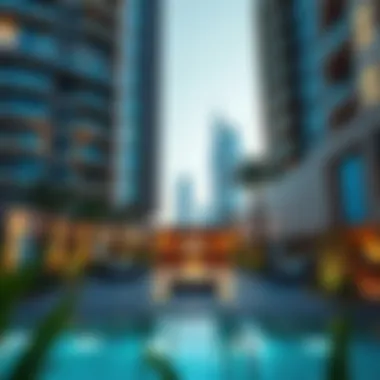
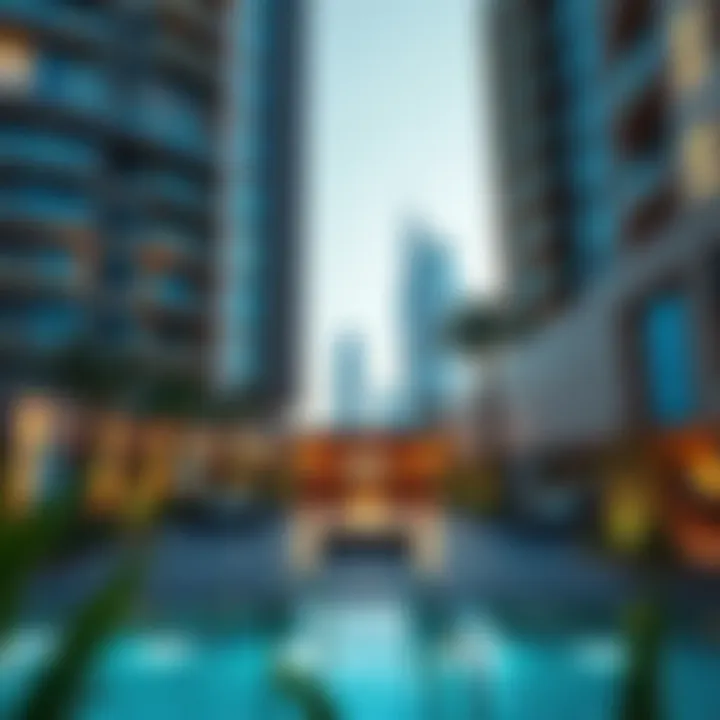
Important: Without understanding these laws, investors could inadvertently fall victim to legal disputes, leading to lost money and time.
Property Registration Process
Once you grasp the ownership laws, the next step is familiarizing yourself with the property registration process. In Dubai, this process is conducted under the authority of the Dubai Land Department (DLD). Here’s a breakdown of the steps involved:
- Sales Agreement: Draft and sign a sales agreement between the buyer and seller.
- Inspection: Conduct a thorough inspection of the property to ensure it meets your requirements and standards.
- Obtain No Objection Certificate (NOC): This document, usually required from the developer, indicates that there are no existing dues on the property.
- Transfer of Ownership: Both parties must visit a DLD office in person to finalize the transfer. Here, you will also need to pay the relevant fees, which are typically around 4% of the sale price.
- Title Deed Issuance: Once the ownership transfer is approved, a title deed will be issued. This document is the legal proof of ownership, and safekeeping of this document is crucial for future transactions or disputes.
It's essential to understand that while the process might seem tedious, taking the time to go through each step meticulously can help safeguard your rights as a buyer. It also helps establish a clear record of ownership, vital for any future sales or inheritances.
Being informed and prepared can make buying luxury properties in Dubai a rewarding experience rather than a cumbersome task. By navigating the legal aspects carefully, investors can seize opportunities and enjoy the myriad benefits of Dubai's flourishing real estate market.
The Role of Real Estate Agents
In the realm of Dubai's luxury properties, the presence and expertise of real estate agents can’t be overstated. They are not merely intermediaries; they are vital liaisons between buyers, sellers, and the intricate market dynamics. Understanding the landscape and navigating through various properties can be overwhelming for potential investors and homebuyers. Hence, enlist the help of skilled agents who know how to cut through the red tape and find the right opportunity that aligns with your needs.
Real estate agents play a multifaceted role, including providing market insights, negotiating deals, and ensuring compliance with local regulations. Their input can significantly influence transaction speed and ease, making them essential partners in the luxury property market.
Choosing the Right Agent for Luxury Real Estate
Selecting the right real estate agent is crucial when it comes to luxury properties. Not all agents are created equal, and those involved in high-end real estate must possess specific skills and knowledge. Here are some key factors to consider:
- Experience in Luxury Markets: Look for agents who have a proven track record in high-net-worth transactions. Checking their past sales records can give you a clearer picture of their capability.
- Strong Network: A good agent should have connections with other professionals in the luxury sector—from mortgage brokers to interior designers—allowing them to provide comprehensive service.
- Effective Communication: It’s essential that the agent understands your needs and preferences. They should not only listen but also provide feedback and counsel, helping you make informed decisions.
- Market Knowledge: They should have insights into the latest trends in Dubai’s luxury market, from emerging neighborhoods to architectural styles. This knowledge assists in positioning you better to make advantageous investments.
Deciding who to trust in your property journey is like taking a deep dive into a pool without knowing how deep it is. The right agent will guide you to avoid pitfalls and seize opportunities.
The Importance of Local Expertise
In a diverse and rapidly evolving market like Dubai, local expertise plays a pivotal role. Real estate agents must not only know the market but understand local culture, regulations, and trends. The nuances of Dubai’s real estate landscape can differ vastly from other regions, necessitating specialized knowledge. Here are several reasons local expertise matters:
- Understanding of Regulations: Local laws surrounding property transactions can be complex and vary widely. An agent familiar with these regulations will ensure all necessary documents are correctly filed and that you avoid legal headaches down the road.
- Insight into Neighborhoods: Areas can have very different vibes and characteristics that affect desirability and pricing. An agent with local knowledge can advise on the best neighborhoods tailored to your lifestyle or investment goals.
- Cultivating Relationships: Local agents often maintain relationships with sellers, other agents, and even municipal authorities. These connections can lead to exclusive listings or favorable negotiations that an outsider may not access.
"The real estate market is all about connections; it's not just about what you know, but who you know."
- Cultural Awareness: Luxury properties often attract international buyers. An agent who understands different buyer profiles can tailor their approach based on cultural sensitivities, making the buying experience smoother.
Future Trends in Dubai Luxury Real Estate
The luxury real estate market in Dubai is evolving at breakneck speed, making it paramount for investors and buyers to stay updated on emerging trends. Understanding these developments not only helps prospective buyers make informed choices but also provides investors with insights into which areas will yield favorable returns. The changing landscape is influenced by a mix of technological advancements, demographic shifts, and global economic factors that redefine what luxury living means today.
Emerging Neighborhoods to Watch
Dubai’s growth has seen certain neighborhoods becoming the go-to destinations for luxury properties. While classic areas such as Palm Jumeirah and Downtown Dubai maintain their appeal, several emerging neighborhoods are gaining traction. Here are a few worth considering:
- Dubai Creek Harbour: Positioned as a contemporary urban area, Dubai Creek Harbour offers stunning waterfront views and several luxury developments that mix modern architecture with cultural elements. The upcoming Dubai Creek Tower, projected to be one of the tallest structures in the world, is expected to further amplify property values in the vicinity.
- Jumeirah Village Circle (JVC): Though traditionally more budget-friendly, JVC's strategic location and the quality of new luxury developments are drawing attention from discerning buyers. The area is fast becoming a blend of sophistication and affordability.
- Business Bay: As a key business district, Business Bay is transforming into a luxury hotspot, merging office spaces with high-end residential units. The waterfront location and proximity to Downtown Dubai make it a prime candidate for new developments.
It's crucial to keep an eye on these neighborhoods as they evolve. The combination of planning, investment, and lifestyle amenities can significantly impact property values and desirability in coming years.
Sustainability and Eco-Friendly Developments
Sustainability has shifted from a buzzword to a necessary criterion in the luxury real estate sector. Investors and buyers are more inclined to consider the ecological impact of their purchases, leading to a rise in eco-friendly developments. Key aspects to consider include:
- Green Certifications: Many new properties are now designed to meet environmental standards, such as LEED certifications, which ensure energy efficiency and lower carbon footprints.
- Innovative Building Materials: Developers are opting for sustainable materials that not only look elegant but also reduce environmental impact. From recycled steel to organic paints, eco-conscious choices are shaping the luxury market.
- Smart Technologies: Integrating technology with sustainability, smart homes that optimize energy usage and enhance security are at the forefront of luxury living. From automated lighting systems to advanced climate control, these features not only increase comfort but also lower utility bills.
“In the luxury real estate sector, sustainability isn't just a trend; it's becoming a standard expectation.”
Astute buyers should look for developments that prioritize eco-friendliness along with luxury, as this dual approach ensures long-term value and resonate with global shifts toward environmental consciousness.
End: Navigating the Dubai Luxury Real Estate Market
As potential investors, homebuyers, and real estate professionals, understanding the complexities of the Dubai luxury real estate market is crucial to achieving success. This vibrant market has seen remarkable transformations and continues to evolve alongside the bustling city itself.
The importance of comprehension in this area can't be overstated. First, let’s consider that Dubai remains a top destination for wealth and investment. With its diverse selection of luxury properties, ranging from villas on Palm Jumeirah to chic apartments in Downtown Dubai, it draws buyers from all corners of the globe. As a buyer, knowing where to look and what to expect can make all the difference between a satisfactory experience and a regrettable one.
One must also take into account the unique characteristics that define the luxury market in Dubai. Properties here often come with extravagant features, like private pools, state-of-the-art facilities, and stunning views that can elevate one’s lifestyle. Thus, the need to thoroughly research local neighborhoods is paramount. Each area offers distinct advantages and considerations that should align with personal or investment goals.
"Understanding local demographics, regulatory frameworks, and market trends is essential for navigating this dynamic landscape."
Further, being informed about the legal aspects surrounding property ownership in Dubai is non-negotiable. The laws can often be complex for foreign investors, so expert guidance is invaluable. With regulations shifting, particularly regarding freehold zones and property registration processes, a seasoned real estate agent can provide clarity and confidence throughout the buying journey.
In addition, potential investors should be aware of economic factors influencing property values. Significant changes in the global economy can send ripples through the Dubai real estate market, affecting both short-term investments and long-term holdings. For example, shifts in oil prices or international trade policies might impact buyer demographics, which may directly influence property demand.
Finally, it's worth noting that sustainability and eco-friendly developments are becoming increasingly crucial as investors lean towards properties that promote responsible living. Identifying properties that fit within this framework not only meets growing demand but can also secure future value.
In summary, navigating the Dubai luxury real estate market is not just about purchasing property; it is about understanding the overall ecosystem. An astute investor will consider lifestyle, legality, market dynamics, and future trends. This strategic approach, paired with local expertise, can position buyers not just to enter the market but to thrive in it.















